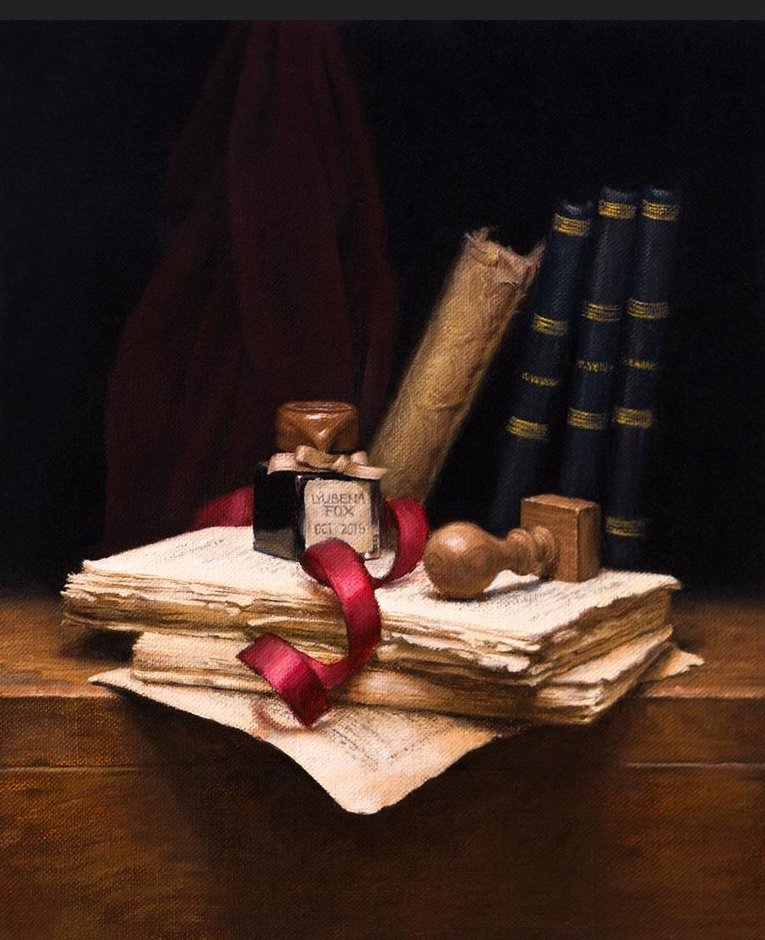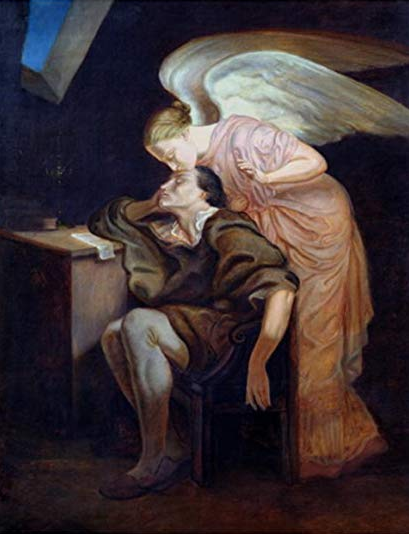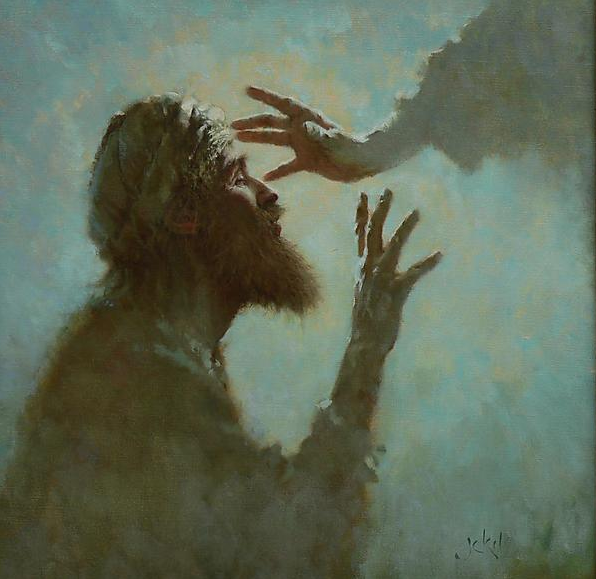 Editor’s note: The following sermon by Henry Charles Beeching, preached before the University of Oxford, on the third Sunday in Advent, 1896, is extracted from Inns of Court Sermons (published 1901). All spelling in the original.
Editor’s note: The following sermon by Henry Charles Beeching, preached before the University of Oxford, on the third Sunday in Advent, 1896, is extracted from Inns of Court Sermons (published 1901). All spelling in the original.
“And they sing as it were a new song before the throne, and before the four living creatures and the elders.” — Rev. xiv. 3.
“A new song”: the word is echoed from the Psalter and from every part of it. “O sing unto the Lord a new song, sing unto the Lord all the whole earth”; “O sing unto the Lord a new song, let the congregation of saints praise him”; “O sing unto the Lord a new song, for he hath done marvellous things”; “I will sing a new song unto thee, O Lord, for thou hast delivered David thy servant from the peril of the sword”; “I waited patiently for the Lord, and he inclined unto me and heard my calling, and he hath put a new song in my mouth.” So it was from age to age in Jewry, so it must be throughout the Christian ages; not only because each individual has to learn for himself the beauty and wonder of the universe, and not only because God’s compassions are new every morning, and day by day man discovers with ever fresh delight what God has done for his soul; but also because the outward order itself is ever changing, ever moving onward on its predestined path, and “God fulfils Himself in many ways,” and so the recognition of the new order requires a new song; and yet again, because the words which in their newest gloss reveal with vividness to one generation this or that aspect of things, become dulled by repetition and perhaps entirely divorced from the reality they once aimed at expressing, being at the best really inadequate to their task.
The lesson urged to-day upon us Churchmen by our Prayer-Book is faithfulness to our prophetic work as stewards of Christ’s mysteries, bringing out of the treasury things at once new and old, so as to win the disobedient to the wisdom of the just; and following this lesson, I propose, fathers and brethren, to consider, on this occasion, what are the necessary elements and what the peculiar difficulties of religious poetry. I would ask you to reflect why it is that with so remarkable a genius for poetry as the English people undoubtedly possesses, the least satisfactory part of its achievement is its new song before the throne.
The purpose of all poetry is to illuminate our experience of the world: it is one method of interpreting life to us; and the means it employs to this end are passion and imaginative thought. Passion is of the first necessity, because it is only when the mind is at white heat under the influence of some powerful emotion that the contents of the mind become so thoroughly fused as to flow readily into a new imaginative mould. And the true poet is one who is always passionate: custom lays on him no benumbing finger; he finds in the beauty of the world and in the simple lives of men, with their affections, their sufferings, their heroic endeavours and defeats, perpetual interest, a never-failing spring of emotion, be it joy or sorrow, pity or fear. And then, just as the gift of tongues required its complement in the gift of interpretation, so the poet’s endowment is not complete unless he can convey to us the emotion he feels. This he does to a great extent imaginatively; that is to say, the part of experience which moves the poet, and about which he desires to move us, is brought into sudden vividness through association with some other experience whose value is clearly known. When the Psalmist says, “My days are gone by like a shadow, and I am withered like grass,” there arises before our mind, as before his, the picture of some hot Eastern landscape; and as we look at the grass all dry in the sun’s glare, there passes over it faster or slower, at the slowest all too fast, the shadow of a bird’s wing. And in the light of that image his emotion at the transitoriness of human life becomes ours. All poetry, then, must be a fusion of these two elements, passion and thought.
That illustration from the 102nd Psalm, though it occurs in a religious poem, is not, of course, religious poetry; it is a poetical illumination of a fact of human life, which everyone must recognise to be a fact whatever his religion, and perhaps most keenly if he have none. But the facts with which religious poetry deals are either not common matters of experience, or, if they are, they are matters of experience which have already a Christian interpretation; and in this latter case, there is an alternative risk, either that the religious poet will go straight to the facts that have roused his emotion, and represent them apart altogether from their Christian interpretation — or, that the work of reflection that is involved in attending to this interpretation will cool his emotion. The danger is that his Christianity will get the better of his poetry, or his poetry of his Christianity. This will appear more clearly if, following our text, we consider what are the three branches into which religious poetry divides itself. The new song is sung (1) before the throne, and (2) before the living creatures, and (3) before the elders. Man’s religious thought and passion must always radiate in these three directions: it will be bent on God, or on nature, or on human life.
The least beset by difficulties and as a rule the most successful religious poetry is that which belongs to the first two classes: lyrical expression of the soul’s delight in God, or in the world of nature regarded as His handiwork. In regard to the first of these divisions — the soul’s delight in God — the feelings of admiration and hope and love and worship that the poet must express will be so simple that there is small chance of a collision “between his instinctive religious emotions (which are to a certain extent Christianised) and his Christian creed; nay, we find it possible to use to-day with not so very much mental reservation and correction the religious lyrics of the Jewish church; though in this case the song, of course, becomes “new” in the sense that we sing it not only before the Father and the sevenfold Spirit, but also before the Lamb in the midst of the throne. In regard to the song before the living creatures — the soul’s delight in nature — the Christian creed is so broad, that provided the beauty of nature be ascribed to God, the Christian can sympathise both with Cowper, who lays the greater stress on God’s transcendence, and with Wordsworth, who lays the greater stress on His immanence; nay, even when poets who are not only not Christians, but not Theists, sing about nature, provided they faithfully describe the glory that moves them to song, — the light that most truly is on sea and land for those who have eyes to see it — the spirit in things —
Be it love, light, harmony,
Odour, or the soul of all
Which from heaven like dew doth fall —
I say, if the poet render this faithfully, his song is religious, and the religious man can join in it, and supply the interpretation that is lacking; for he knows that the love and light and harmony are due to the interpenetration of things by the Creator-Spirit of God. Now in this direct praise of the Godhead which I have been describing, whether it be praise for God’s wonderful works in grace or in nature, although the subject-matter of the poet’s song may seem forever the same, the song if it is to carry our hearts with it must be forever a new song; it must be both fresh felt in passion, and it must be fresh dipt in thought. Most of us are at some time in our lives moved to verse by some strong religious feeling of joy or thankfulness, and the poor success of our endeavours is as a rule due to this, that our thought is not as new as our emotion. A man of genius differs from his fellows in the fact that he has a deeper insight into things, so that they never become commonplaces to him; the simplest thing by the branches it puts out, the ties it suggests to so many things else, is a perpetual source of interest, and the tritest facts of nature and grace never cease to be a revelation. But it is too often considered that feeling alone is enough equipment for a sacred poet, and then we get, roughly speaking, hymns, — such hymns at least as make up the bulk of our Collections: verses where the facts of revealed religion are gratefully acknowledged, but which bring no fresh insight, no new interpretation, no new light from any quarter, to recreate the experience. I would ask you, whether all the emotional hymns (say) upon our Lord’s Atonement strike home so deeply and so freshly to our heart the old truth that “God so loved the world,” as those few lines of Shakespeare —
Why, all the souls that were were forfeit once;
And He that might the vantage best have took
Found out the remedy?
But the religious poet has not only to sing his song before the throne, and before the living creatures; he must sing it also before the elders; he has to interpret anew to the Church the Christian interpretation of man’s life, its success and failure, its joy and sorrow, its sin and its death. And the reason of the great difficulty he finds here — to which I have already referred — lies in the fact on which St. Paul lays stress — that the natural comes before the spiritual;” That is not first which is spiritual, but that which is natural; and afterward that which is spiritual”; and this in more than one sense.
(i.) The spiritual interpretation of the world, let us say of such a phenomenon as death, does not lie on the surface ; and there is a natural explanation which is always ready to present itself. Now, when the poet is deeply stirred by this fact of death, when his passion is liberated, and the world shaken to and fro in his imagination, it is almost necessarily this first natural view of death that possesses him. If, indeed, he is considering the thought of death abstractly, or even if he is looking forward to it as Browning does in “Prospice,” or reflecting upon it long afterwards, like Tennyson in the “In Memoriam,” then he will remember he is a Christian; but at first when the shock comes it is not the reflective mind that is at work, recalling and reconsidering the traditional religious interpretation, and perhaps taking fire at that to a re-interpretation; it is the imagination that is at work, roused by passion. The fact of death lies once more in its naked awfulness before the poet, as the world lay before Adam, compelling him to utter the dread name; and shudderingly he names it. It is the final loss that appals him; the lamp is shattered, the wine is spilt ; “the silver cord is loosed, the golden bowl broken; the pitcher broken at the fountain, the wheel broken at the cistern.” Consider for a moment those verses, wrung from the greatest poet of our own day by the death of his friend : —
Break, break, break,
At the foot of thy crags, O Sea !
But the tender grace of a day that is dead
Will never come back to me.
The sea’s voice, breaking on its “cold grey stones,” has sung a song of natural and inevitable fate; and the poet has heard and understood; and his song — a song of natural and inevitable fate — a song of loss that might have come from Mimnermus, will echo in the hearts of Englishmen when the “In Memoriam” lies as dusty on the bookseller’s shelves as the “Essay on Man” does to-day. Or, to take an even more pointed instance from the same poet, consider the exquisite opening lines of “The Deserted House” —
Life and Thought have gone away
Side by side,
Leaving door and windows wide —
and then consider the intolerable appendix afterwards added to Christianise it, — lines that have neither passion nor thought nor rhythm. No, “that is not first which is spiritual, but that which is natural; and only afterward that which is spiritual”; and the worst is, that before this arrives, the impulse to sing has gone.
(2.) And there is a second sense in which religious poetry is hampered by the precedence of the natural. The heyday of the blood in which the passion is strongest, and the imagination most active, is often a day of revolt against tradition, and especially against that traditional interpretation of the deepest facts of life, which we call Christianity. I need only point to Shelley, expelled for the waywardness of youth from this University, but whose sepulchre has lately been built in his own college with exceptional honour. That Shelley ranked himself as a servant of “the Truth,” and lived as resolutely as most Christian people by the highest ideal he could discover, no one would now dispute; but the sad fact remains, that in his “Ode to Liberty” he branded as “impious,” and stamped in the dust with all the passion of his poet’s nature, “the name that is above every name.”
(3.) But yet again, even where there is no actual revolt against Christianity, it would seem true that whereas the main emotion of Christianity is joy, and its main effort the discovery of “a soul of goodness” in the world’s evil, it is the sombre aspects of life which appeal to the poetical sensibility more keenly than its joyful aspects : —
The sweetest songs are those that tell of saddest thought.
When Shakespeare tells us that young gentlemen in his day would be sad as night only for wantonness, he is passing a criticism upon the minor poetry of all time; and even greater poets have sometimes felt themselves called to be like a nerve over which should creep “the else unfelt oppression of the earth.” And so much poetry (even that which calls itself religious) is pessimistic. Still the greater poets, it must be owned, almost always consider it to be their function to look for an optimism on the further side of the pessimism; and thus, even when they do not name the Christian name, they range themselves under the Christian standard.
For this work, a larger canvas is required than is supplied by the pure lyric. When it is attempted in too short compass, either the pessimism must be undervalued, or else the passion of the poet exhausts itself over the pessimism, and the optimism becomes merely abstract — becomes, in fact, gnomic poetry, which is not poetry at all. It must nevertheless be recognised that sometimes this “dialectical” work (if I may so term it) has been accomplished effectively “within the sonnet’s humble plot of ground.” A very fine instance is Milton’s sonnet on his blindness, in which the often-quoted line, “They also serve who only stand and wait,” which is the new thought the poet wins for us, the burden of his new song before the elders, escapes the unimpressiveness usual with gnomic verse, by carrying always with it the passion of what has preceded — the systole and diastole of the poet’s heart pleasing with his Maker. But it is chiefly in the wide space of the epic, or in the drama with its slow development, its crisis, its catastrophe, that the vindication of the spiritual forces of life is most successfully accomplished. In the Shakespearian drama there is no fate ; — no fate at least of which man is not master; and no laws but the laws of the spirit. Of our later poets, Browning has signalised himself by such an endeavour as I am describing: his failures are conspicuous enough; it must, for example, have struck every reader, that in the epilogue to Dramatis Personae where David, Renan, and the poet himself state their views, the poet in Browning has almost inevitably thrown all the passion and the imagination into the pessimistic view which as a theologian he is combating — and a great deal of Browning’s later writing is work of pure reflection, and not imaginative at all; but still his successes are no less conspicuous, and deserve the warmest gratitude of the Christian Church. Consider the vivid illustration he has given in poem after poem to the great Christian dogma that the divine spirit is a spirit of love, that the redemption of man’s spirit must be accomplished by love, and that there is no human heart so cold or dead that a spark of redeeming love may not be kindled in it. And take for one example his character of Guido in “The Ring and the Book.” The old Pope has seen that the one chance for Guido lies in the truth, that goodness is goodness and that God is not mocked, being flashed upon him by the suddenness of his fate; and so it comes about. No one familiar with the poem can ever forget the cry that breaks from Guido in the agony of the realised nearness of the death he had dealt so callously to others, and felt so secure from himself; the scream with which he calls upon all possible and impossible saviours, human and divine : —
Abate, Cardinal, Christ, Maria, God;
and as the climax, the name of his own despised and murdered wife : —
Pompilia, will you let them murder me?
And this illustration may remind us, and with this I will conclude, what help or what hindrance the poets may render to the Church in her battle against the world and the flesh according as they exalt or despise the spirituality of the marriage tie. In this generation, when a crowd of novelists have been teaching that adultery is the legitimate privilege of both men and women, the great and more popular writing, must render it ephemeral, as to a true taste it has always been insipid. But when this is allowed for, there remains a small but excellent body of verse, written always with scrupulous care, and informed always by this great passion, which, as our great Oxford critic said of it many years ago, “always strengthens and purifies”; and for this the Church may thank God. There are doubtless at this moment in the University not a few young men whose thought and passion will one day seek utterance in song: may they never take a less high view of their high calling than Coventry Patmore.










